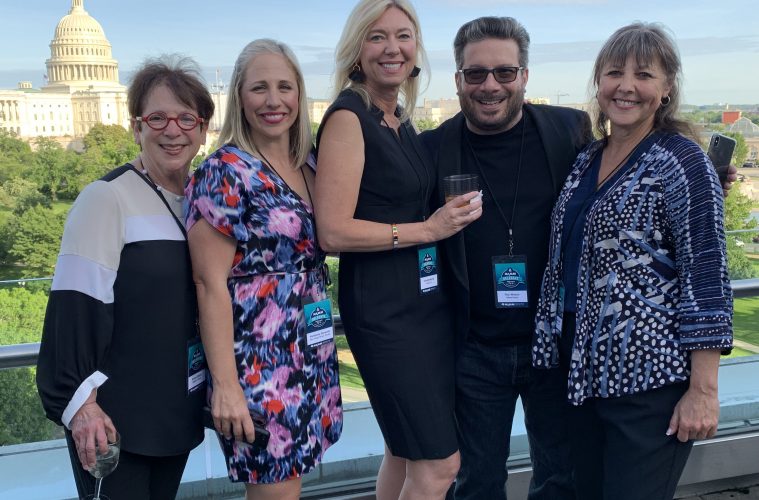$550 million. To an individual, such wealth is often only achieved by Powerball winners. But for a federal budget, it’s not much money at all. And $550 million represented NAMM’s top “ask” during its Music Education Advocacy D.C. Fly-In, which took place May 20-23.
Ninety-one NAMM members, retailers and manufacturers alike took to the nation’s capital to encourage politicians to fully fund the Every Student Succeeds Act (ESSA) from its current $1.1 billion to $1.65 billion. “We urge support to fund this Title IV program at its authorized level of $1.65 billion in fiscal year 2020 to ensure that the well-rounded goals of ESSA are realized for every child,” NAMM wrote in a packet distributed to Fly-In delegates.
“Why do we do this?” asked Joe Lamond during a preparation day on May 21 at the law firm of Nelson Mullins near Capitol Hill. “It boils down to four letters: more to start playing, fewer to quit (MSFQ).”
Many delegates were first-time attendees at the event, making the prep day even more important. So Lamond was certain to note they should enjoy the experience and not be intimidated by the grandeur of the U.S. Senate and U.S. House of Representatives, where a majority of the May 22 meetings took place.
“You belong here. You belong in these offices. [Politicians] work for us,” Lamond emphasized.
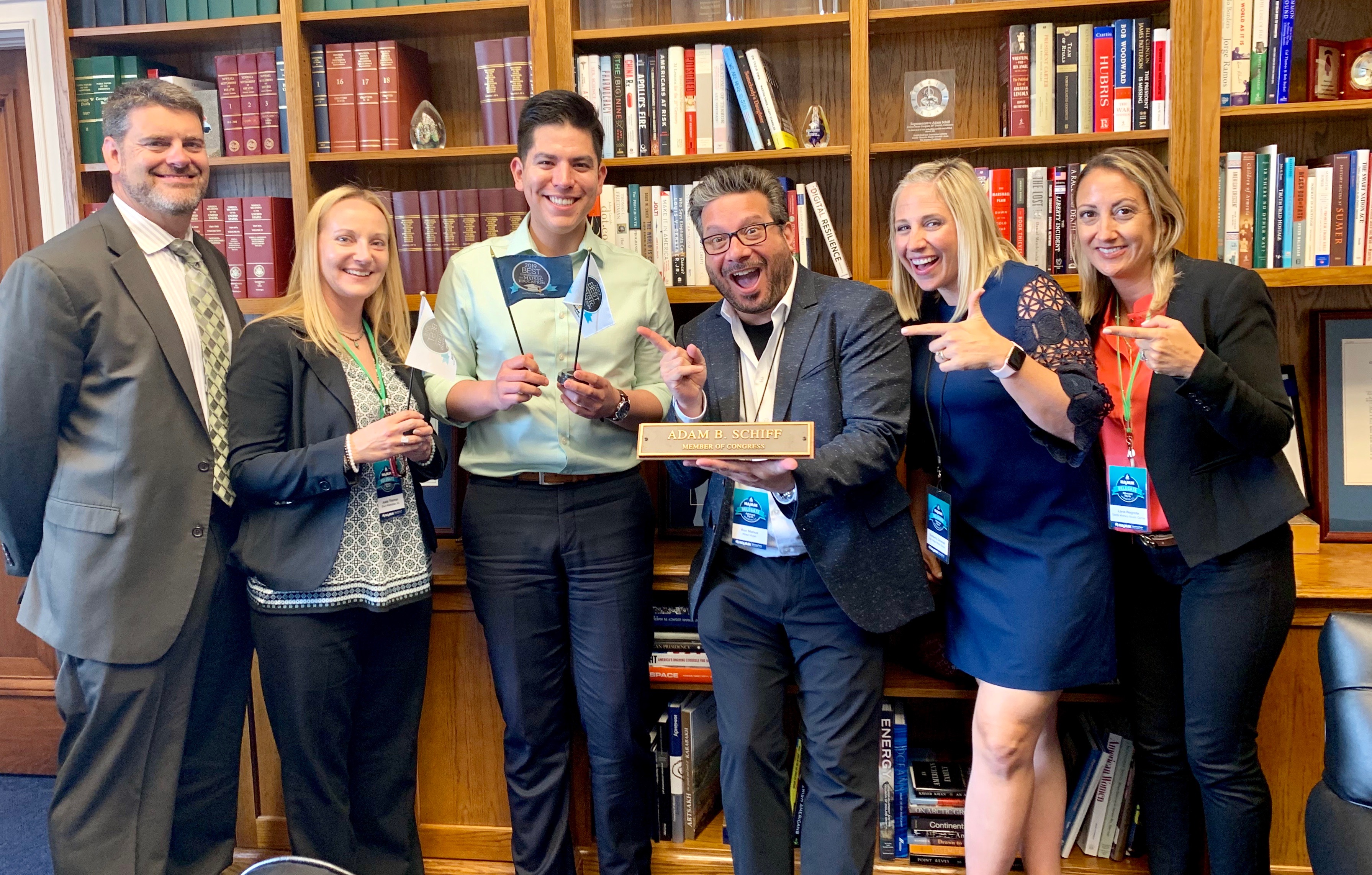
L to R: Bryan Bradley, Group One Ltd.; Juels Thomas, Drum Workshop; Anthony Thiessen, Legislative Aid for Congressman Adam Schiff (D-Calif.); Ron Manus, Alfred Music; Kimberly Deverell, San Diego Music Studio; and Lana Negrete, Santa Monica Music Center
Rapper J. Dash, author of the hit song “The Wop” with Flo Rida, added that he was first invited to the Fly-In by Yamaha Corp. of America partnerships and alliances manager Dave Jewell, but he initially felt he wasn’t qualified to advocate on Capitol Hill. “When I got here [to Washington], it was hammered in that I have the right to be here. The [politicians] work for me. They represent what you’re interested in, so why not tell them what your interests are?”
Added Progressive Music’s Mark Despotakis in a separate breakout session on May 21: “Never undervalue the competency you bring to the table as a business owner. … Never underestimate the power of what you believe in. You will walk away inspired.”
Many Fly-In delegates did just that. Whether Congress will fully fund the ESSA is still to be determined. The Music & Sound Retailer attended nine of the meetings on May 22. This year, we ventured out with delegates from the states of New York, Pennsylvania, Oregon, Nevada, Connecticut, Michigan and Iowa. Among the meetings, one member of Congress, Susan Wild (D-Pa.) sat in for the entire meeting, led by C.F. Martin’s Chris Martin and Lamond. Two members of Congress appeared at the meetings that were led by their staffs, freshman U.S. Rep. Max Rose (D-N.Y.) and Jahana Hayes (D-Conn.). Suzanne Bonamici (D-Ore.), winner of the 2018 NAMM SupportMusic Champion Award, was unable to attend our meeting, but she had a good reason: We actually saw her on TV speaking in front of Congress while in her office.
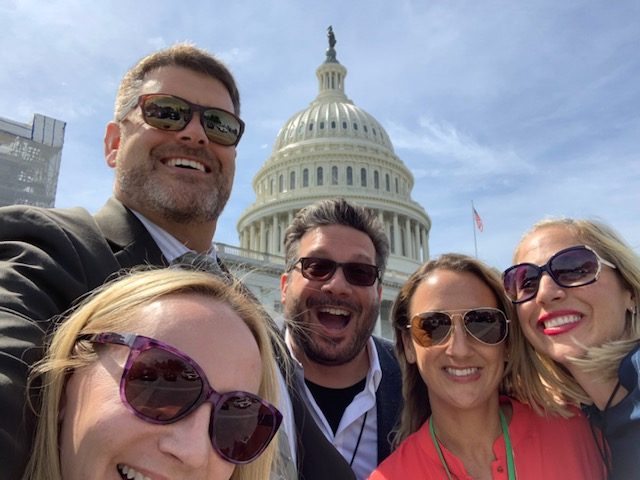
L to R are Bryan Bradley, Juels Thomas, Ron Manus, Lana Negrete and Kimberly Deverell.
Bonamici has long supported MI, however, something Lamond made sure to relay to Rachael Bornstein, the Oregon Congresswoman’s chief of staff. “This is more a meeting about saying thank you for all she does,” said NAMM’s president and CEO.
The other meetings were all led by politicians’ staffs, with the Retailer visiting the offices of U.S. Sen. Charles Schumer (DN.Y.), Congressman Jerry Nadler (D-N.Y.), Congressman Mark Amodei (R-Nev.), Congresswoman Debbie Dingell (D-Mich.) and Congressman Dave Loebsack (D-Iowa). Music education, a bipartisan issue, received plenty of positive vibes from members of Congress, U.S. Senators and their staffs. In fact, Erin Schnell, senior legislative assistant for Loebsack, seemed genuinely happy we were in her office. She quickly noted her mother encouraged her to play music, stating it makes you better at math. “These are easy things to support,” Schnell said during the meeting, led by NAMM chairwoman Robin Walenta. “We are definitely behind you guys. We appreciate your efforts supporting this.”
Responded Walenta, “I can’t think of anything that has a bigger impact on schools than music.”
“[Music is] something I care a lot about,” added Wild during a separate meeting.
“Education funding is a huge priority,” asserted Seema Ibrahim, legislative aide for Schumer. “If he could, he would double it.” Bernie Williams “It’s very important work. The Congressman understands it,” said Hector Colón, legislative assistant for Rose. “We definitely want to be partners.”
The Retailer also attempted to visit Julia Brownley’s (D-Calif.) office. We were told we could not enter the office and that the Congresswoman’s conversations were private. However, we contacted Brownley’s office after the missed meeting, and Carina Armenta, communications director, apologized for what took place. She added that education is extremely important for the Congresswoman and issued a statement from Brownley for this magazine.
“Music and arts education plays a critical role in fostering creativity and has proven to be a positive outlet for many students of different walks of life,” said Brownley. “I am pleased to see this year’s increase in funding for these important programs, and I will continue to work toward reaching the promise we made in the Every Student Succeeds Act to fully fund the Student Support and Academic Enrichment Grants (SSAEG) program, which is used by arts and music programs in Ventura County and across the nation to enrich the lives of our young people.”
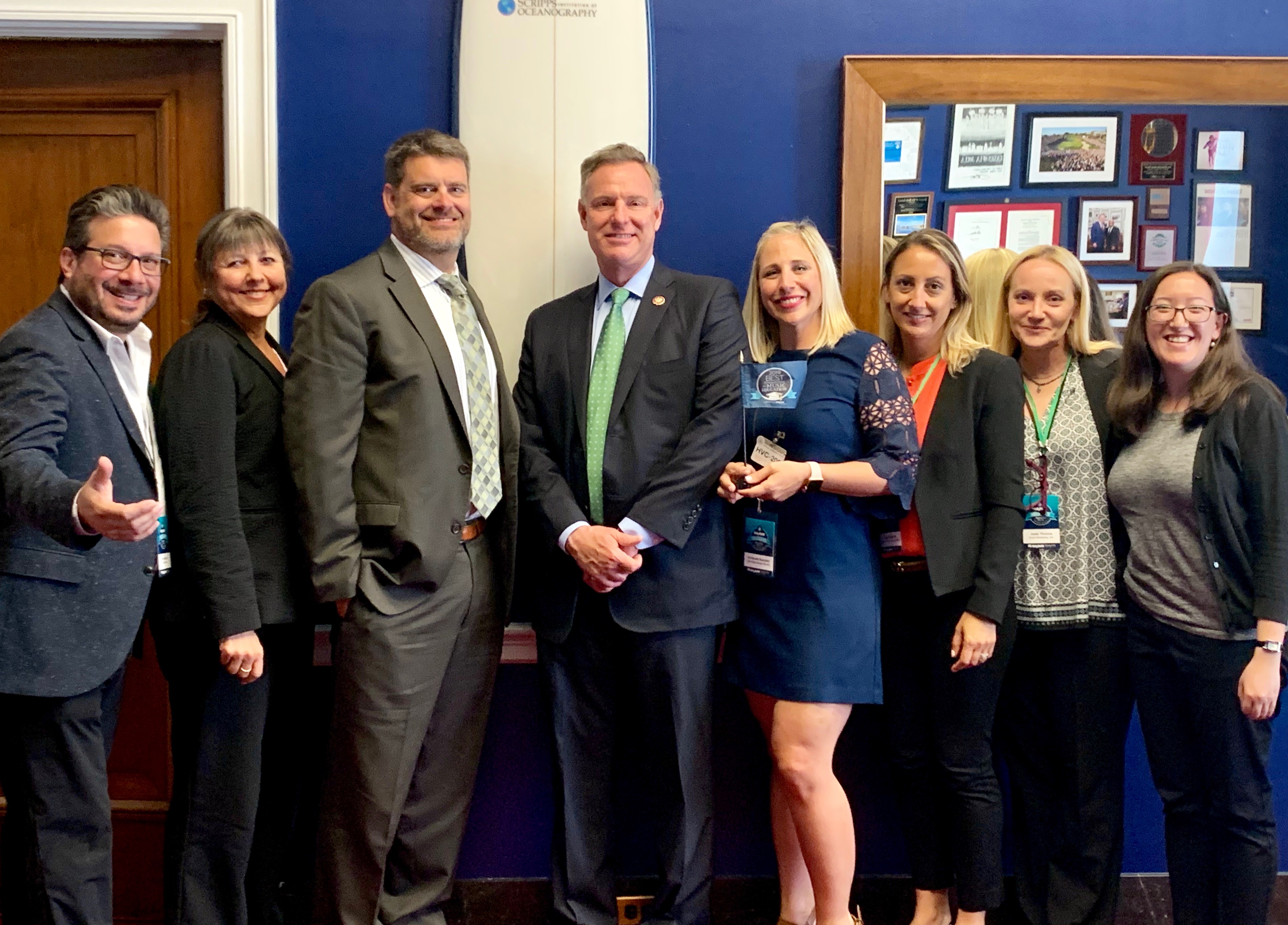
L to R: Ron Manus; Barbara Wight, Taylor Guitars; Bryan Bradley; Congressman Scott Peters (D-Calif.); Kimberly Deverell; Lana Negrete; Juels Thomas; and Arlene Pun, legislative aid for Peters
Other Asks
Increased ESSA funding wasn’t the only NAMM delegate ask during Capitol Hill meetings. Also requested was support for fulfilling the intent of ESSA’s Title I and Title II with authorized funding. Title I supports funding for the nation’s most vulnerable children. Title II promotes the effectiveness of teachers.
In addition, NAMM urged ongoing support for national arts and culture organizations, specifically the National Endowment for the Arts, which provides competitive grants in every state and congressional district.
U.S. Rep. Bobby Scott (D-Va.) pledged to continue funding the National Endowment for the Arts (NEA), something he confirmed is currently in jeopardy in the 2020 federal fiscal budget.
“The president’s budget for 2020 seeks again to eliminate the National Endowment for the Arts,” Scott said during a May 21 speech at a dinner after receiving NAMM’s Support- Music Champion Award. “It is not wasteful or unnecessary spending.”
Added Scott, “It is in fact going to be in the budget,” he said to a thunderous applause. “… We are going to make sure that gets funded again.”
Ibrahim added that Schumer also supports the NEA. “He’s been supportive of NEA for quite some time,” she said.
Delegates also handed out take-home materials for politicians to review following each meeting. Among these were Best Communities for Music Education flags for winning school districts, as well as Yale University School of Music’s “Declaration on Equity in Music for City Students.” The declaration reads as follows:
- “1. We call for every student in every city to have access to a robust and active music life.
- This call is animated by the values of dignity and inclusion.
- An active music life affirms the dignity of individuals and communities.
- 4.We decry the inequities that deny some city students access to an active music life.
- City students’ access to an active music life requires the ongoing development of supportive music ecosystems.
- We call for all city students to have access to in-school music education taught by certified music educators.
- We call for strategic partnerships with local organizations to expand and enrich cities’ music ecosystems.
- We call for changes in the development, training and support of music education and teaching artists.”
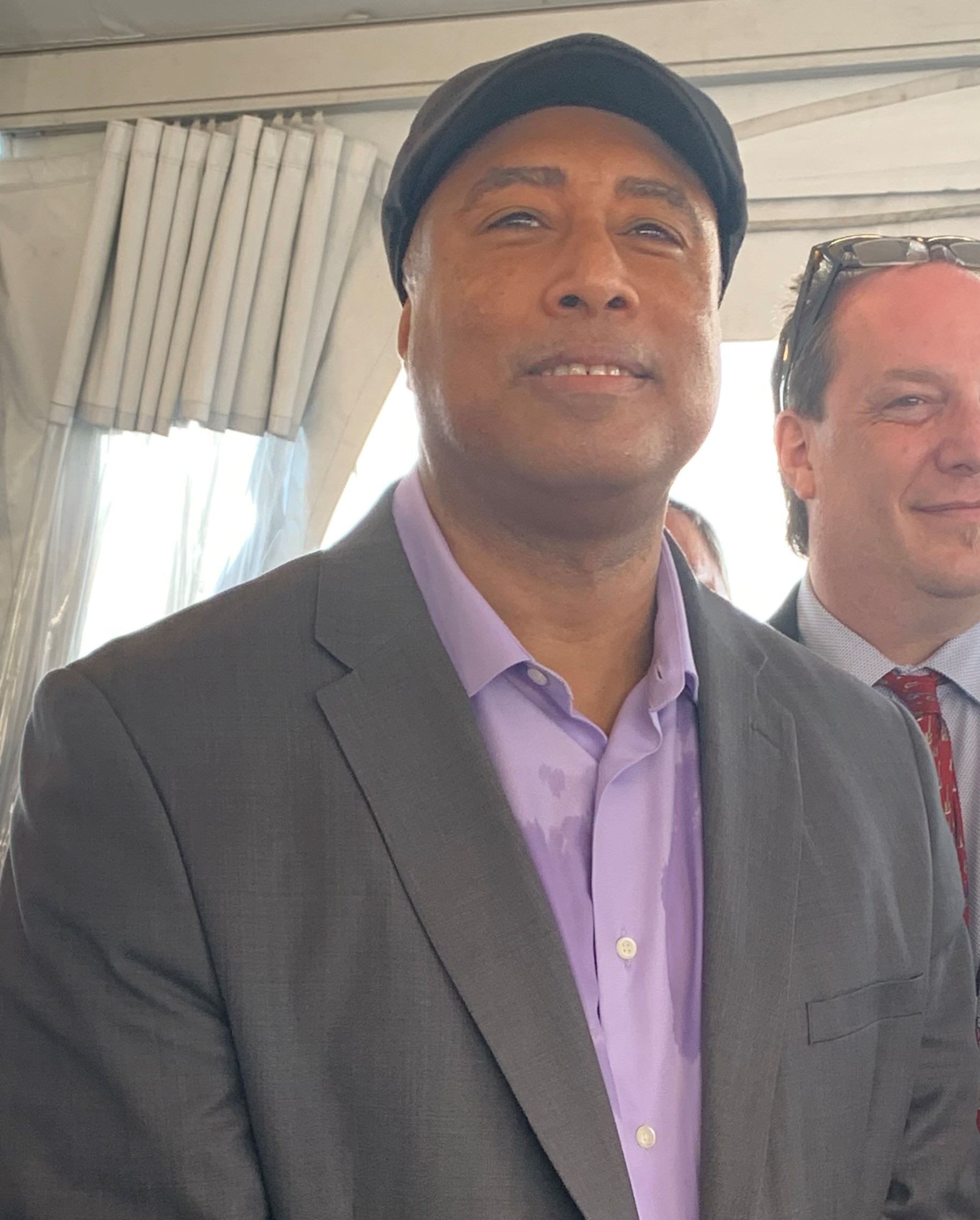
Bernie Williams
Another Ring for Williams
Although the Capitol Hill visits were clearly a highlight, perhaps the best moment during the Advocacy Fly-In came on May 22, when World Series champion and music advocate Bernie Williams received NAMM’s inaugural Music Education Champion award, honoring his service to the MI industry. The award was presented in ring form by NAMM president and CEO, Joe Lamond, and Mary Luehrsen, NAMM’s director of public affairs and government relations.
Williams delivered a passionate speech, in which he stressed that attending the Fly-In is now the most important date annually on his calendar. 2019 marks the 10th time Williams attended the Fly-In. “I have requests to do hundreds of things throughout the year, and I try to do the best I can,” he said. “The ESSA [Every Student Succeeds Act] passed in 2015. I had something to do with that. In 20 or 30 years from now, a kid from P.S. 138 in the Bronx will say, ‘Somebody thought it was important for me [to have a music education].’”
Williams added he was asked by a reporter what is more important to him: a great career in baseball or his music advocacy efforts. “There is nothing that compares with something that has to do with the education of our kids for years to come,” he said, choking back tears. “I wish my parents were here to see this. I know they are looking down on me and are very proud of me. I am very proud of them. They told me, ‘You can be in music, sports or anything else, as long as it’s legal.’ … This is one of the best things to ever happen in my life.”
Williams and J. Dash weren’t the only stars on hand at the Fly-In. “Madame Secretary” actor Erich Bergen made the trip as well. Bergen cares about music advocacy so much that he confirmed he will again attend the event in 2020. But first, he recalled when he was young and a member of the school choir: “I was able to apply my love of music for something that wasn’t just a dream on television. It was something tangible. My happiness changed. I really came to life.”
The actor added that many of his friends from the choir did not ultimately obtain a career in performing arts, “but they still credit that time singing together as to why they are successful in whatever business they went into.”
Bergen stressed that music is a universal language and an non-partisan issue. “Through every depression, through every natural disaster, the thing that always survives is music. Music is everywhere,” concluded Bergen. “The fact that music is not an essential part of one’s education …. The fact we are still trying to prove this is so bizarre to me.”
At the Table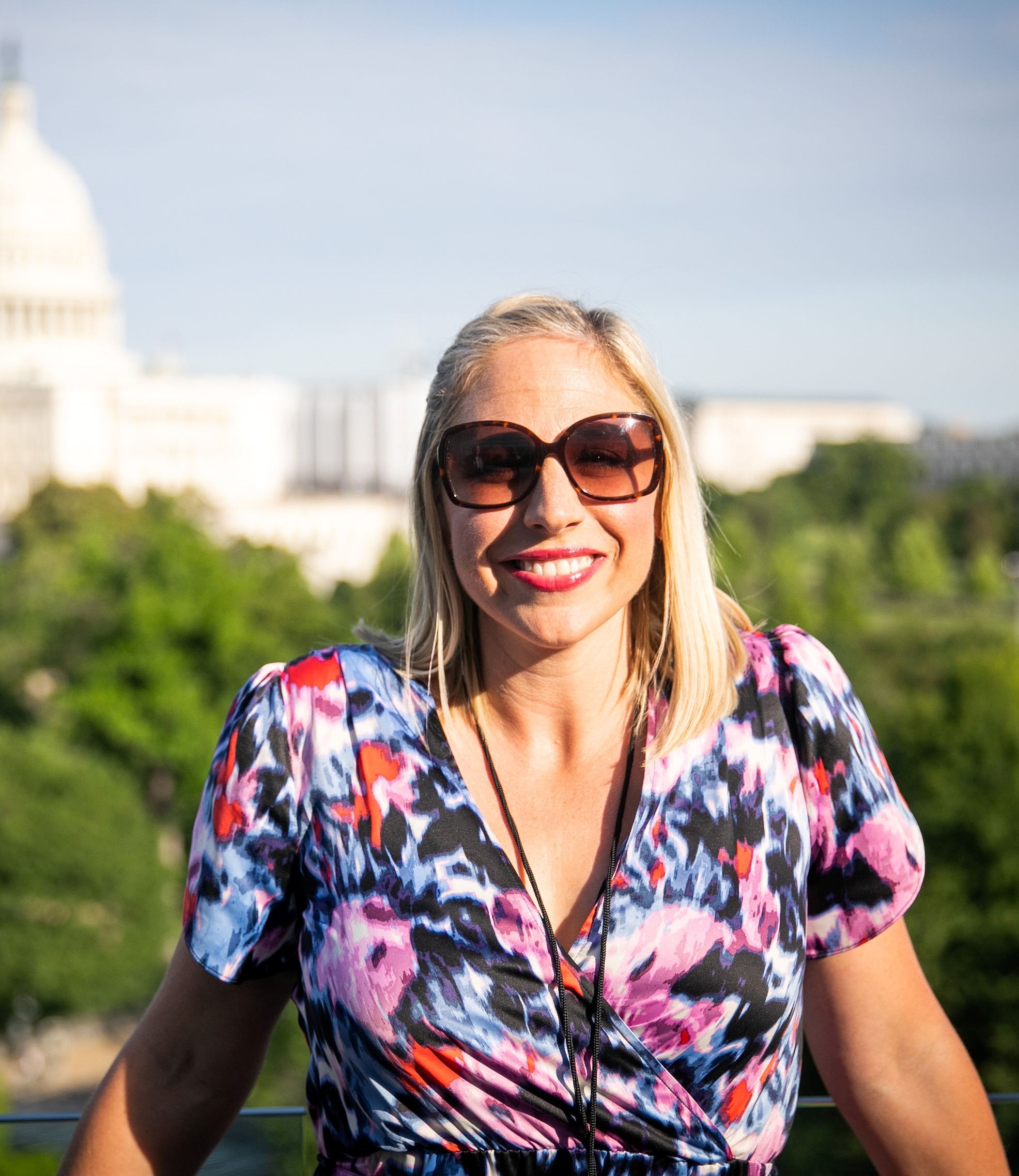
My view of the NAMM Advocacy Fly-In
By Kimberly Deverell, San Diego Music Studio
A wise woman once told me, “If you aren’t at the table, you are on the menu.” This single statement struck a chord with me and has compelled my participation in the NAMM Advocacy Fly-in every year. NAMM and its delegates have been “at the table” for more than a decade now, and it is apparent that we will not accept being on the menu. Our continued efforts over the years have laid the groundwork to bridge the gap in equity and provide a well-rounded education for all children. Little by little, year after year, we are influencing change and making a difference.
There have been three major federal education laws in our nation’s history. In 1965, the Elementary and Secondary Education Act was passed with the intent to stress equal access to education for all children. In 2001, the law was reauthorized as the No Child Left Behind Act, which seemed good in theory, but placed so much emphasis on test scores that music and arts programs were essentially eliminated. Finally, most recently in 2015, the Every Student Succeeds Act (ESSA) was passed with language that, for the first time ever, acknowledged music and the arts as being essential to a well-rounded education, thanks in huge part to the efforts of NAMM, its national partners and its army of member delegates.
My first Fly-In trip in May 2016 was dubbed the “Thank You Tour.” Our message was simple: to thank members of Congress for signing ESSA into law while continuing to reinforce the importance of music education to a well-rounded education. It was an exciting and celebratory year. YAY!!! The law had finally passed. Now what?
And so, the next step in this journey began: Get it funded! ESSA had authorized $1.65 billion in federal funds annually for Title IV, Part A, Student Support and Academic Enrichment Grants (SSAEG), but authorizing a law and actually funding it are two very different things.
Over the next 2 years, NAMM delegates persisted on Capitol Hill requesting that Congress fully fund ESSA, a law that passed with bipartisan support, at the full amount they deemed necessary for the law to be successful: $1.65 billion. As part of the annual message, NAMM skillfully devised the Best Communities for Music Education (BCME) flag presentation in which delegates honor Members of Congress (MoC) with a desktop flag if a school within their congressional district has received the BCME designation. The flag not only provides recognition to the MoC, but it encourages publicity outreach to the school or district that receives the award. Additionally, delegates deliver these flags to every MoC with schools/districts that have received the BCME designation, thus opening the door to new relationships with offices with whom there was no prior association.
This most recent Fly-In, the BCME Flag presentation was taken a step further. Using the newly elected class of MoC to our advantage, delegates attempted to schedule meetings with all offices that had received the BCME title, even those that had no constituents within that congressional district. This gave us the opportunity to not only meet with new offices, but to also meet with first-year MoCs and introduce them to NAMM and its mission. It was a strategic move to cast our nets wider and to cultivate new relationships, and it proved to be very successful!
In its first year (fiscal year 2017), ESSA was grossly underfunded at $400 million. FY18 proved to be much better, with an increase of $700 million, bringing the total funding to $1.1 billion. This past May, the overall attitude was positive that the education budget would likely increase again. The fact that the funding continues to rise year after year is not a coincidence.
In the years since the passing of ESSA in 2015, meetings with MoC were hit or miss. Offices were skeptical of the new law and its proposed funding, especially considering the current administration’s lack of support. Most of our meetings were spent educating staffers on the NAMM organization and the importance of music education in schools. But this year was different. After a record-setting 250-plus meetings with MoC, the overwhelming sense of our mission was optimistic.
Lana Negrete, a first-time delegate from Santa Monica Music Center, said of her experience: “This year was my first D.C. Fly-In with NAMM. I had lobbied before in Sacramento on various matters with our California State PTA; but never at a national level on Capitol Hill. I did not know what to expect, and have to say, I was blown away! The preparation given to us, and the knowledgeable team that escorted us, was phenomenal. We were armed with such detailed and pertinent information for our representatives that, not only did it make it easy for us, but it also made us look good in every meeting. The journey opened my eyes even more as to what NAMM means to our industry and to the community around us. I am proud to be a part of an organization that is actively partaking in every aspect of our industry. This is just one more access point NAMM is giving to its members so that we can fully participate in all things music.”
Our presence in Washington for the past 10-plus years has made an impact. When you walk into a Congressional office and see the BCME flags from the previous two years sitting on the desk, you know we have made an impact. When the legislative aid you have met with the previous three years walks into a meeting and gives you a hug and states, “This is my favorite meeting of the year,” you know we have made an impact. When the MoCs you have been trying to meet with for the previous three years finally take the time to meet with you, you know we have made in impact. When MoCs engage and ask, “What can we do to help?” you know we have made an impact. When the funding you are asking for continues to increase year after year, you know we have made an impact. Our presence in Washington has undeniably made an impact, and it is because we have been, and will continue to be, at the table.
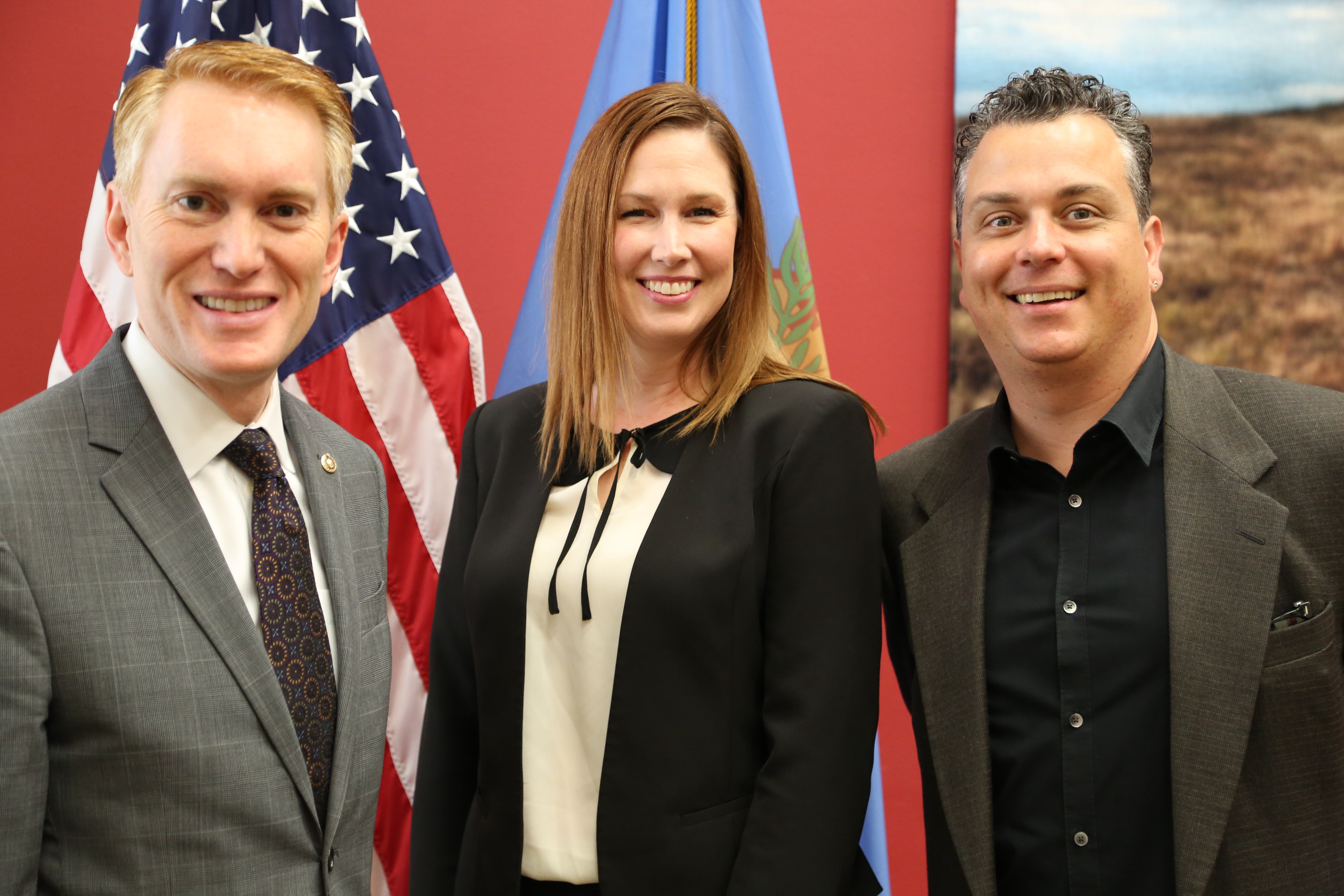
Sen. James Lankford (R-Okla.) (left) joins Guitar Center’s Stacey Spencer and Donny Gruendler.
Guitar Center on Capitol Hill
For a second year, Donny Gruendler, Ed.D., Guitar Center vice president of music education, met with Senators, U.S. Representatives and other elected officials to advocate for school-level music programs across the nation as part of the annual NAMM Music Education Advocacy D.C. Fly-In. In a series of meetings with these officials, Gruendler and his colleague Stacey Spencer discussed the multitude of benefits that music education espouses, such as increased brain function, focus and language development. They reinforced the importance of music as part of a well-rounded education and urged funding of the Title IV program at its authorized level of $1.65 billion in fiscal year 2020 to ensure that the goals of the Every Student Succeeds Act (ESSA) are realized for every child. Gruendler secured one-on-one meetings with the following members of Congress: Sen. Maggie Hassan (D-N.H.); Sen. James Lankford (R-Okla.); Sen. Jack Reed, (D-R.I.); Sen. Jeanne Shaheen (D-N.H.); Sen. Brian Schatz (D-Hawaii); Sen. Sheldon Whitehouse (D-R.I.); Rep. Tom Cole (R-Okla.); and Rep. Mark Takano (D-Calif.).
As one of the largest supplementary music education providers in the country, Guitar Center Inc. has an additional reach into education legislation and connections that helped NAMM in reaching other key representatives, particularly those that reside on the HELP committees (Health, Education, Labor and Pension), as well as the Appropriations committees and Education subcommittees.
Additionally, Gruendler shared new research from the Kennedy Center’s Turnaround Arts program and The NAMM Foundation, in which researchers explored music education instruction, specialists and curriculum at Turnaround Arts schools. The research found that, as schools invested in music education, the quality of and access to music education increased from 27.8 percent to 75 percent, and the average number of minutes of music instruction per week increased from 17 to 33, nearing the national average of 40 minutes per week.
“Beyond the intrinsic value of music to students nationwide, education in music has benefits for young people that transcend the musical domain. Thus, it is very important that we allow today’s youth to study music regularly,” said Gruendler.
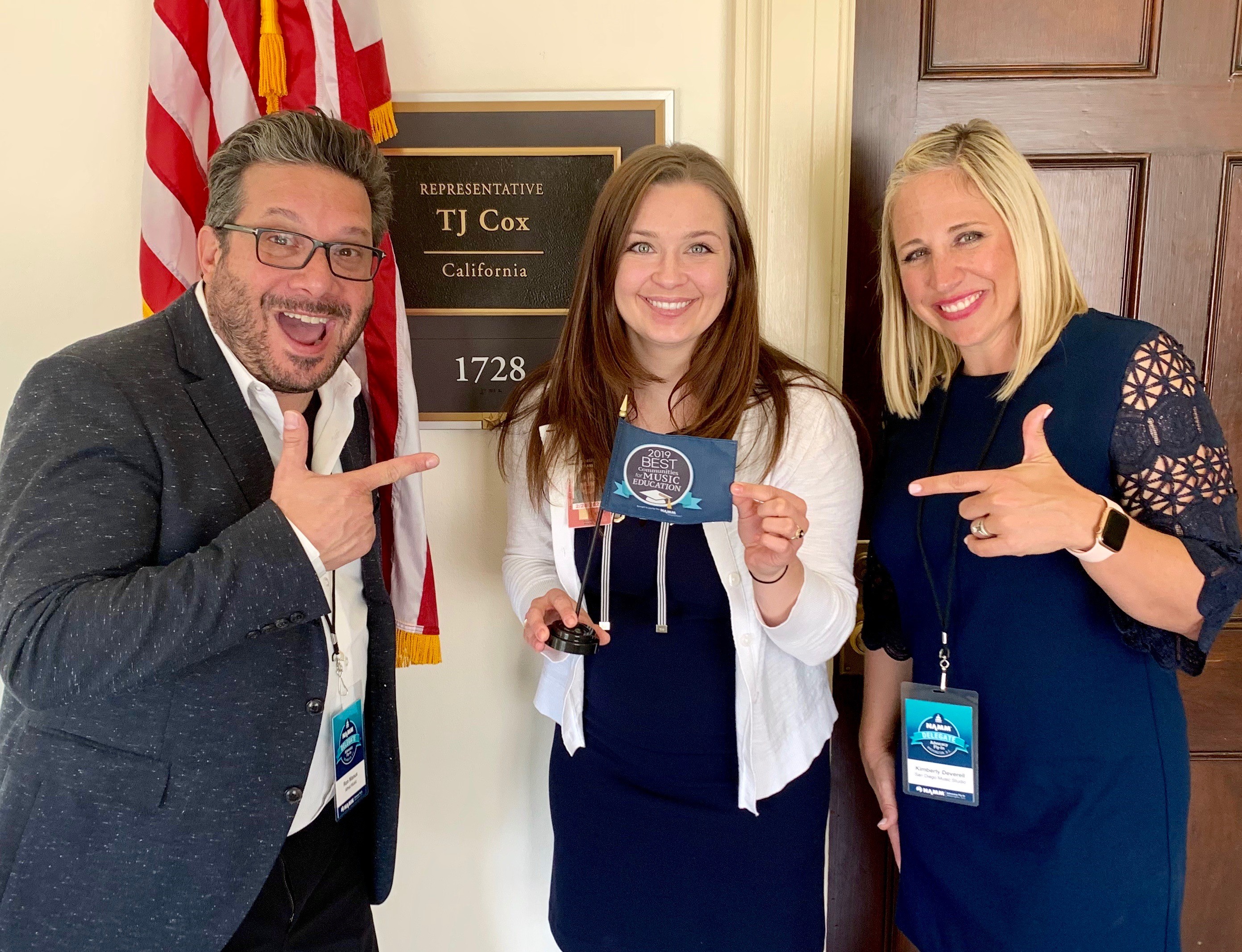
L to R: Ron Manus; Amanda Stayton, legistlative aid for Congressman TJ Cox (D-Calif.); and Kimberly Deverell
Comments From Other Delegates
Here’s what four other delegates said about their NAMM Advocacy Fly-In experience:
“This year we could really see the momentum building in our efforts to get the Every Student Succeeds Act fully funded! It was great showing up in Congressional offices and being greeted with, ‘My favorite meeting of the year’ by our friends in Congress. Music is so important for our schools. It unites the school and brings everyone together in a profound way. After all, how can you have a high-school football game without a marching band? We are fighting to ensure that every child who has the desire to learn and participate has access to a quality music education.”
—Ron Manus, Alfred Music
“Having the opportunity to represent our industry in this critical movement is a privilege and something that I look forward to every year. Making sure that music and arts is a part of every child’s education is imperative to their growth and development, and the NAMM Foundation has created excellent resources for anyone to advocate in their schools.”
—Tiffany Stalker, KORG USA
“It is such a privilege to participate in the Fly-In and fight to ensure that every child has access to a well-rounded education that includes music. Music is important to the growth and development of our youth, and I want every child to have the same access and opportunities in music that I was fortunate to have growing up. It is extremely encouraging to hear several of the Congressional offices that we visited agree and offer their support to fully fund the Every Student Succeeds Act.”
—Jennifer Paisley-Schuch, Alfred Music
“In my 11th year of attending the NAMM Fly-in, it’s very apparent that it only gets better. Every year NAMM’s clarity of mission becomes more focused, and the NAMM team continues to outdo themselves. The education you receive from attending the NAMM Fly-In and learning about advocacy is invaluable. The day before the Fly-In, when members visit Capitol Hill, is the Advocacy Training Day. I would call it a boot-camp-style experience, one where you learn how legislation truly works. It’s a master class on the art of negotiations. NAMM’s Mary Luehrsen and the team from Nelson, Mullins, Riley & Scarborough, as well as the NAMM staff, highlight every detail and thoroughly present it to you so, when you go to Capitol Hill, you go with absolute confidence in your understanding of NAMM’s mission: to advance support from legislators, in order that every child has access to a quality music education in schools.
“When it comes to supporting the message of music education, it is truly irrelevant what role your business plays in the music industry; the music education message pertains to all music businesses. And who better to deliver that message than NAMM? We must be the ones to take it to Congress, and we should be the ones telling our customers that, as leaders in the music industry, we have helped forward the important understanding that music makes a difference. The widely acclaimed benefits of music education have become national news and are excellent tools that help create the best and brightest 21st-century leaners. This is our message, and our customers need to know we advocate for them.
“The one crazy moment for me was the gift of being asked to play music with Bernie Williams before he was recognized for 10 years of service as the main celebrity spokesperson for NAMM and the NAMM Foundation. To sit in with Bernie, Jason Gano (Cordoba Guitars) and the great jazz guitarist Howard Paul (Benedetto Guitars) was certainly a moment for the highlight reel. So, a tip of the hat to great people doing import work for a very important cause.”
—Menzie Pittman, Contemporary Music Center


